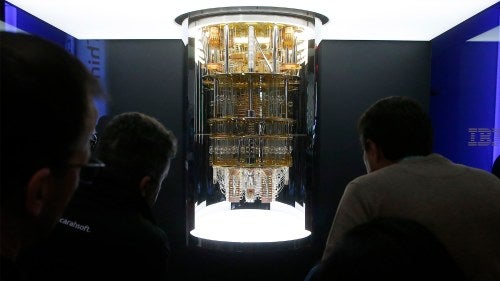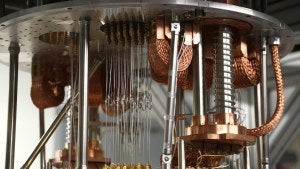What's a "Quantum Job"? A Q&A with Illinois's First Chief Quantum Officer

We asked Dr. Preeti Chalsani to help us explain the state's newest tech industry, which may soon create tens of thousands of "quantum jobs."
“Chief quantum officer” might sound like a job title from Star Trek, but Dr. Preeti Chalsani works right here in Chicagoland – not on the deck of the Enterprise.
In this brand-new role at Intersect Illinois, Dr. Chalsani recruits quantum tech companies to come to Illinois to help build an emerging industry.
Gov. J.B. Pritzker and the federal government have both bet big on quantum. This year, the state announced that a multimillion-dollar Illinois Quantum and Microelectronics Park would be built on the long-vacant U.S. Steel South Works site on Chicago’s Far South Side. Anchored by Silicon Valley-based PsiQuantum and supported by the Defense Department’s bleeding-edge tech research team, DARPA, the campus is Illinois' most visible effort to date to cement Chicago as the world’s quantum capital.
Still, there’s intense international competition in the sector, especially from China, and the stakes are high. Compared to traditional computers, quantum computers are exponentially more efficient at solving especially complex problems. That means that, in addition to applications in materials science and pharmaceutical research, quantum computing could be used to break encryption and harvest once-safe data – including national security secrets.
We asked Dr. Chalsani to help us connect the physics to the economics and explain why the state thinks this industry can create tens of thousands of “quantum jobs” – even for workers without college degrees.
This interview has been edited for length and clarity.
ChicagoGlobal: The state has several ongoing quantum projects – was this position created to pull them all together? Would “Quantum Czar” be a fair description of your role?
Preeti Chalsani: I like that! It’s a little bit of that.
The state has had a lot of wins in quantum. A lot of those started with R&D, but now we're also succeeding in the commercialization efforts and in attracting companies to Illinois. We've started building an industry here.
This being an emergent field, it's sort of complicated. There aren’t well understood processes for what a company needs to grow or establish itself. Even mature companies are still working very closely with researchers. That is not something you will see in the traditional computing industry.
Quantum, being at this sort of emergent phase and exploding into lots of sectors, brings together a lot of different stakeholders. The idea for this position is to have someone who's really focused on this, and not have it be part of some other portfolio.
ChicagoGlobal: What exactly is quantum computing? How is it different from classical computing?
Preeti Chalsani: The way I think about quantum computing is it's a new mode of computing. It's almost like a new math.
The very classic example is: If you think of a light bulb, it’s either on or off – that's classical computing. For quantum computing, the light bulb can be in a superposition of on and off states. So, depending on when you look at it, there is a probability that it's either on or off.
It sounds very weird, [but] it's a real thing. It's been physically tested, proven. It's a way of doing math that allows us to do things that we couldn't do before. It's not simply that it's faster; it gives us access to a whole different way of doing things.

Closeup of electronics used in a quantum computer. (Photo: Seth Wenig / AP)
ChicagoGlobal: I’ve heard an analogy, too, that it’s not like quantum computing is like a faster car. If classical computing is a car, it’s like quantum computing is a boat.
Preeti Chalsani: Exactly. You're never going to use a quantum computer to go on the internet. We'll still have laptops to do email and things like that. That's not what it's meant to replace.
ChicagoGlobal: The state has projected that commercializing the quantum industry will generate $60 billion in economic impact for Chicago's metro area in the next decade. In addition, local quantum campuses are expected to create more than 30,000 quantum jobs by 2035.
What is a “quantum job”? What kinds of jobs are needed to make, run, and use quantum computers?
Preeti Chalsani: When quantum computing was first conceptualized, it was something that happened in labs. It was scientists and researchers with years of expertise who were working on it.
But now we're at the point where it's an industry. People are building quantum computers that are actually being deployed and being used by companies. It's matured to the point where we need lots of different types of jobs to make a quantum computer operate.
Some of those jobs are still PhD-level scientists and researchers, but a lot of those are engineers who don't really know how the quantum computer specifically functions, but they know how to write programs to control a quantum computer. There’s a whole field of software experts that are needed, but also technical folks who have expertise in lasers or microwave electronics who are not necessarily PhD scientists, but who are the best technicians.
But if you want to be involved in the quantum industry, it doesn't even have to be a technical role. You need lawyers – I actually came out of patent law – you need people in the communications teams, you need H.R. All of these roles are really important and are kind of specific to the industry. There's a lot of interesting work being done to publicize quantum and make it accessible to the public. From the science to arts, people are involved.
ChicagoGlobal: Do you expect that we will get to a point where this sector can bring direct benefits or job opportunities to non-college workers, especially from Chicago's more underinvested neighborhoods?
Preeti Chalsani: Absolutely. There's a huge effort to work with community colleges to train these workers.
There's a lot of instrumentation that goes into this. We use cryostats, for example. The technicians who run those are often people with an associate degree or who've trained specifically for that job and are really good at it and are in high demand.
"And honestly, that's exciting, right? How often do we get to build a new industry in our lifetimes and we have a chance to build it in a way that brings in everybody?"
ChicagoGlobal: There's so many emerging tech sectors: biotech, AI, nanotech, space. Among all these options, why do you think the state has decided to bet on the quantum industry?
Preeti Chalsani: The state has had a strength in science and technology for a long time. So many things happened here, but when it comes to actually leveraging or reaping the benefits of that…where did tech go? To the West Coast. Where did biotech go? To the East Coast. Even though so much of it happened here and we have so many strengths.
Our governor decided we’re not going to let that happen with quantum. We've built up this huge war chest, and there’s so much R&D being done here. The number of PhDs produced here is [very high]. We have this really diverse industry base, and that's fantastic for an emerging industry that is looking for applications. Where else would you want to grow that industry, if not where you can directly access logistics, health care, aerospace, and drug design? This is an ideal place to do it.
So to me, it was a really smart bet. It would have been a lost opportunity to not bet on quantum. Yes, this is an emerging industry – what happens if quantum isn't as big as you think it's going to be? Well, then we’ll have trained a lot of people to solve really hard technical problems, build lasers, and build quantum computers. Those are really valuable transferable skills. We're building infrastructure here that can be used for photonics. That's an existing industry – it's not just for quantum. So it's sort of a way of betting on many things with one bet.
ChicagoGlobal: International competition in this sector is something the governor has talked about several times, and he has said that he's concerned the U.S. isn't doing enough to compete with China specifically, saying “we shouldn't fail at this.”
What are the stakes in the international competition to develop quantum computing, and what's the state's approach to international competition and collaboration in this sector?
Preeti Chalsani: Quantum technologies grew out of a really collaborative community of physicists and mathematicians. Collaboration is really in the DNA. This is how science works. Somebody doing research in Urbana-Champaign knows people in Hong Kong, in Japan, in Brazil, and in the Netherlands. Collaboration is how science advances.
In that sense, it has not been seen as a competition between, like, us and Europe. I know you [mentioned] China, and that's separate – it's a national security competition, it's not a competition about the technology itself.
We're not competing against London to develop quantum technologies. In fact, we're collaborating with them and we're collaborating with many, many companies. The governor went to Canada a few months ago. He went to the U.K. last year. All of these efforts are to build bridges, to build connections between our countries and our cities, because this is a hard thing we're trying to do. We can't do it alone. There's not enough talent in the world to do this if we're competing against each other.
ChicagoGlobal: It's a collaborative culture, but there's also this national security question – especially with regard to China – about the risks from this technology. Is there tension there?
Preeti Chalsani: Certainly if you talk to researchers, yes, there's a huge tension because they just want to do the science. Because of the national security risks, we have certain types of restrictions in place or things that you have to be mindful of – regulations. They're there for a reason, but sometimes it's seen as, “Hey, I just want to be able to collaborate.”
Even with China, there are scientists there who are doing good work, and one wants to be able to collaborate for the purpose of advancing the science. But the stakes are also huge. So one has to take everything into account. There's a lot of factors here, and some of these are well above my pay grade.
But I will tell you, the discussions continue at every level within government, within the science labs. How do we manage this?
This story first appeared in the ChicagoGlobal newsletter, a joint project of Crain's Chicago Business and the Chicago Council on Global Affairs.

